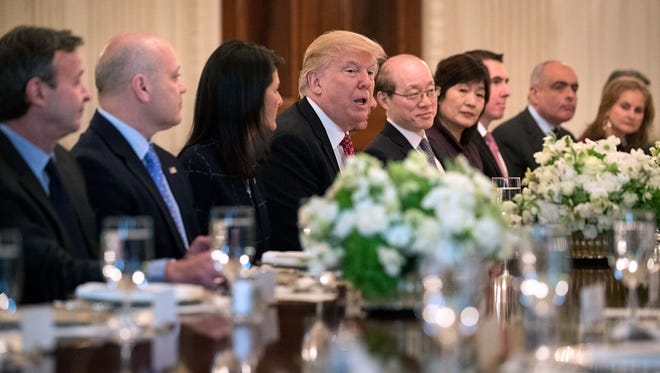Trump sanctions Syria, says United Nations needs to do more

WASHINGTON – While his administration slapped new sanctions on Syria after its use of chemical weapons, President Trump told a group of United Nations diplomats Monday that they need to work harder to confront the Syrian government and other "serious and growing threats" such as North Korea.
"The United Nations doesn't like taking on certain problems," Trump told a group of U.N. ambassadors gathered at the White House, referring to the Security Council's refusal to impose new sanctions on Syria – even after the U.S. carried out an airstrike strike on a Syrian airbase earlier this month.
The U.N. refusal – at the behest of Russia and China – was "a great disappointment," Trump said. "I was very disappointed by that."
Meanwhile, Trump's administration took more steps against Syria. The latest round of sanctions announced by the Treasury Department covers 271 people identified as being involved with the chemical weapons attack ordered by President Bashar al-Assad that reportedly killed at least 80 civilians earlier this month.
Treasury Secretary Steven Mnuchin said the sanctions affect employees of Syria’s Scientific Studies and Research Center, which his department described as the "government agency responsible for developing and producing non-conventional weapons and the means to deliver them." The sanctions will freeze the assets of the 271 targeted employees, and prevent them from doing any kind of business with the United States.
"The United States is sending a strong message with this action that we will not tolerate the use of chemical weapons by any actor and we intend to hold the Assad regime accountable for its unacceptable behavior," he said Monday.
Shortly before the announcement, Trump held a working lunch with ambassadors from countries that are on the current United Nations Security Council.
Appearing with the U.S. ambassador to the United Nations, Nikki Haley, Trump told the group they are going to be "very busy" in the coming years.
"North Korea is a big world problem," Trump said, referring to its nuclear weapons program.
The president, who is trying to persuade China to crack down on North Korea, said the "status quo" over the weapons program is "unacceptable." Trump said he wants to "solve" the problem, though he did not offer specifics beyond calling for stronger United Nations sanctions on Kim Jong-Un's government.
"This is a real threat to the world, whether we want to talk about it or not," Trump said. "North Korea is a big world problem, and it’s a problem we have to finally solve. People have put blindfolds on for decades, and now it’s time to solve the problem."
In a talk that at times sounded like a lecture, Trump also echoed his campaign threat to reduce U.S. contributions to the U.N., complaining about what he called the organization's "bloat" and "out-of-control" costs. The president told the group, "I have long felt that the United Nations is an under-performer, but has tremendous potential."
Yet he had nothing but praise for his own U.N. ambassador, Haley: "I'm so happy with the job that Nikki is doing," he said.
For her part, Haley said she and Trump spoke to ambassadors about issues ranging from Syria to North Korea to "reform" in the way the United Nations does business. "We need them to really engage," Haley said. "We need them to now know that we are about action."